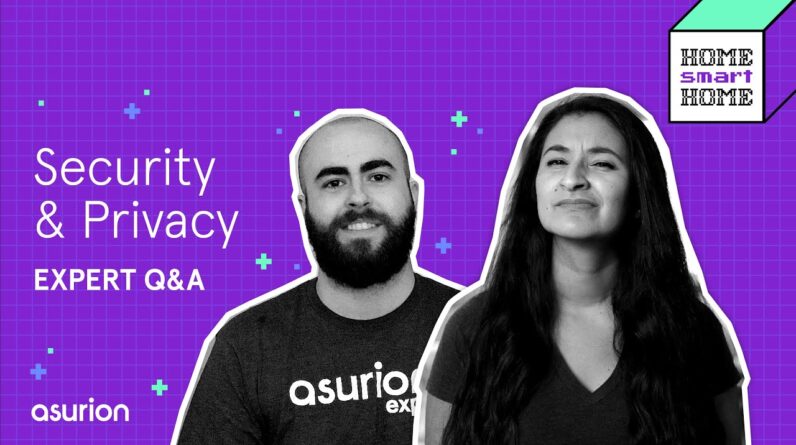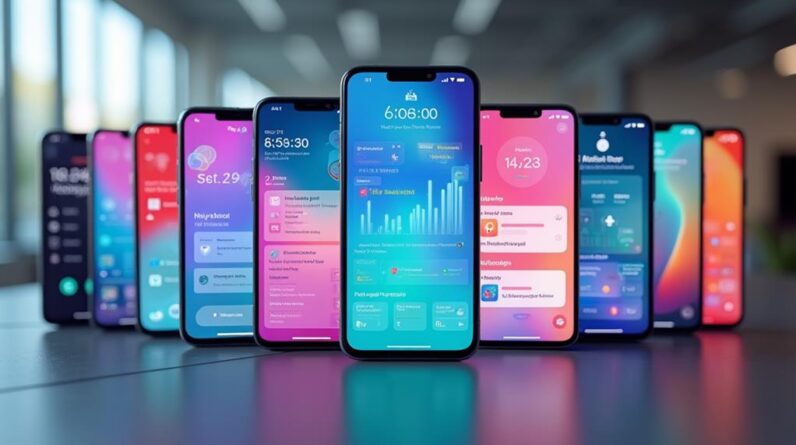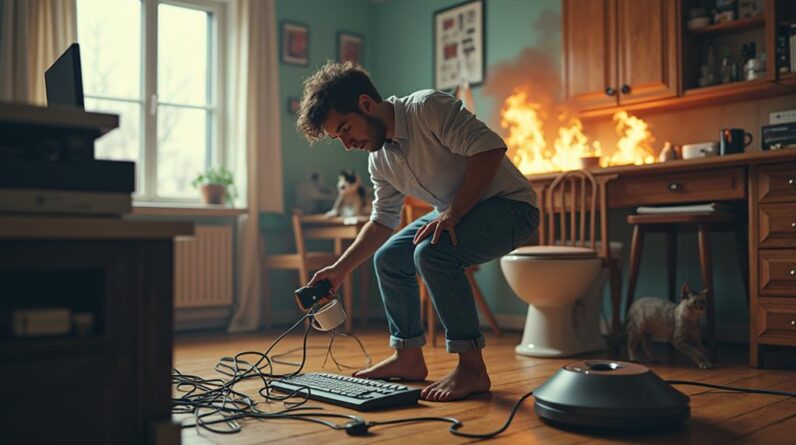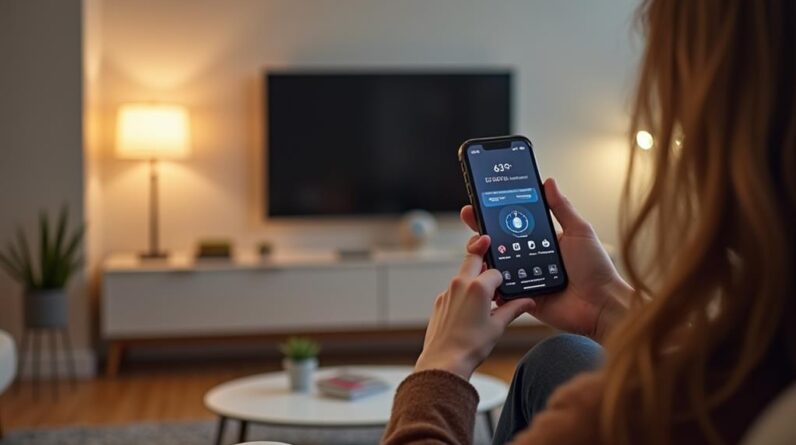
– I'm Jamie, and I'm a
video producer at Asurion. Over the last year I've gotten married and bought my first house. Now, it's time to make that
Home sweet Home, smart, I'll do it with a little
help from my friends and our Asurion experts. This is Home Smart Home. (upbeat music) Hey, welcome back. The smart home journey continues but this episode is going to
be a little bit different. I've already set up smart
cameras, speakers, and a lock, but I haven't talked about one
of the most important steps of setting up a smart
home, Privacy and Security.
I know this is really
important to our customers, and it's pretty important to me too. So I've decided to call my friend and Asurion Expert, Ted, to get some advice on how
to best protect my privacy. Hey Ted, how's it going? – Hey, it's going great!
And we just moved in, so I'm testing out the home office. – Very nice, all right
give it to me straight. Am I being paranoid? Can these devices actually get hacked? – So you're not being paranoid, it's a very legitimate concern. It's a question that a lot
of the customers ask us. I just wanna say first off that the smart home these days is very safe.
The major companies involved, they have a huge investment in making sure that your
information is protected and their reputation is protected, so you shouldn't be too
concerned about that. – But aren't these
devices always listening? Can't they collect data that I don't really want them to collect? How valid of a concern is that? – So technically they are always listening but they're really listening in a very passive state, that just happens inside of the device in your home, and they're really only
listening for the trigger word. Once they hear the trigger word, they do start recording, but they only record so that they can send that information over to the servers so they can fulfill your request. It's not that there's
somebody like nefariously listening to you all day
or anything like that. And if you're ever curious about
what they do have recorded, the companies are legally obligated to let you access that information, and you can do that through their website.
– It might be too late to ask this now that I have four Google
Homes set up in this house, but where would be a good place to start as far as protecting my data and privacy. – So it's never too late
to get into security and to start thinking
about that, for sure. The first place that
you're gonna wanna start is to make sure that your router has a nice long password on it. Security is in length
when it comes to passwords it's not really in complexity, so every character you
add to that password exponentially increases the level of security involved there, so that's the first thing you wanna do. The second thing you wanna do is make sure that your network is split
up into two separate pieces, and most modern routers
give you that option. So you can have one network
that is your personal network where your devices are on it,
the smart home devices are on it.
And then the secondary network would be called a guest
network that you can have a separate place
for people who come over, so they can still use the internet but not have access to your main network. And it's not really like a trust thing; it's not that they don't trust you or you don't trust them,
it's really just more that the fewer people
that have the password to your main network, the
safer you're gonna be online. – I'm glad it's nothing personal when I get thrown the guest
password at a friend's house, so good to know. But, speaking of splitting the network, how difficult is that to do? – It's not that hard, so you can split the
network pretty easily– five, 10 minutes–you just
log in to the router itself and then activate that secondary network, make a good password and all that.
If you're an Asurion customer, we can log in and do
it for you, no problem. – Something else I'm concerned about, Ted, is so many of these smart devices are connected through my phone. The literal keys to my
house are on my phone. What happens if I lose it? How do I keep myself protected? – Yeah, definitely. Our phones these days, they are the gateways
into our digital life. It's how we access all
of that kind of stuff, all of our personal data. The best way to stay protected on that is to just have a lock screen set up, like a good solid lock
screen on your device. It's really great that most modern devices have biometrics built in, so you can either do a
thumbprint, fingerprint, or like facial scan or facial recognition.

That's really gonna take care of the bulk of your protection there in case you were to lose your device. The next thing that I'd wanna watch for is to have two-factor authentication set up on any of the
applications you would use to access your smart home. By two-factor authentication, what I mean by that
is, even if you log in, like if you have the phone and
you log in to the application with the proper password,
if two factor is set up, there is a secondary
verification that happens on a different device, just to make sure that it's you and you, you know, you can
verify it from two places in case you lose one of them.
It's really the best way
to have it all set up, you can actually check on
manufacturer's websites to see if they offer two
factor authentication. Most do, but not all, so you definitely wanna do your research on that. – That's all super reassuring, but I still think about the news stories about baby monitors getting hacked or cameras getting hacked, how do I make sure that
doesn't happen to me? – Yeah, I understand that for sure. So, one thing I wanna say is that's really really uncommon as we said earlier, the smart home is really safe as is. You do see it on the news
and online on occasion, but if it happened all the time, it wouldn't make the news so, you don't need to be
too concerned about it, but if you are, and of
course, just in general, you wanna make sure you accept these software updates that
come through for these.
That's really where the protection is gonna come from in that world. That's what keeps you from getting hacked. It's–the software updates aren't just about, you
know, moving an icon around or changing where something
is housed in the settings. Along with that comes security patches. What those are, is that as soon as people in the outside world figure out how to get around current security measures, the major companies, they
identify that, they shut it down, close that door on that–that way in, and they give that to you through these software
updates and security patches. So you wanna make sure you accept those. The further you push it out, the less secure you're gonna be. – This is all solid advice to stay safe. Is there anything else,
any other nuggets of wisdom you would wanna share
with someone who might still be hesitant about
starting their smart home? – Yeah, sure, you just wanna make sure that you take the extra time–like 30
minutes, really–just to do the things we talked about, like good passwords, splitting up the network,
two-factor authentication, security updates, all
that, it doesn't take long and it really adds to the
already secure, smart home life.
If you're still concerned
about getting hacked or security in general, you can actually buy separate devices that attach to these smart home devices. And what they do is they'll block the way that it listens and sort of changes the way that works and keep you even more secure. – Great, this is awesome, Ted. Thank you so much for your time and your wisdom, and thanks
so much for joining me. – Yeah, you're very
welcome, thanks for calling.
– Okay, I feel a lot less paranoid now, and I'm definitely going to take the time to set some of these things up. The good news is, none of
it seems super difficult, but if I ever get stuck, Ted is always a phone call away. Thanks for watching. If you enjoyed our conversation on privacy and security or wanna follow along on my smart home adventures, be sure and hit that subscribe button.
As an Amazon Associate I earn from qualifying purchases.







